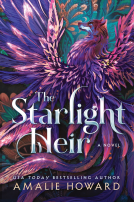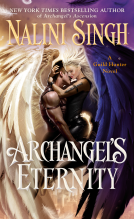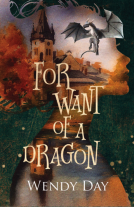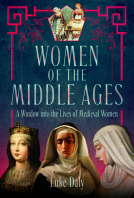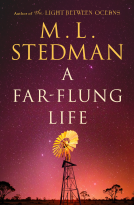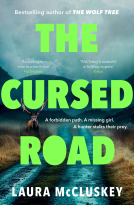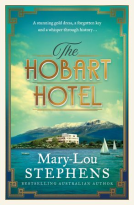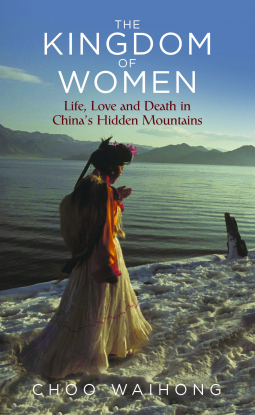
The Kingdom of Women
Life, Love and Death in China's Hidden Mountains
by Choo Waihong
This title was previously available on NetGalley and is now archived.
Send NetGalley books directly to your Kindle or Kindle app
1
To read on a Kindle or Kindle app, please add kindle@netgalley.com as an approved email address to receive files in your Amazon account. Click here for step-by-step instructions.
2
Also find your Kindle email address within your Amazon account, and enter it here.
Pub Date May 30 2017 | Archive Date May 30 2017
Description
FIRST INSIDER ACCOUNT OF THE LAST WORLD SOCIETY WHERE WOMEN RULE
The Mosuo tribe is the last surviving matrilineal and matriarchal society in the world. Here their story is brought to light by Choo Waihong, a top lawyer from Singapore who left behind the fifteen hour days of corporate life to travel China.
From the moment she stepped into the Kingdom of Women, Waihong was captivated. The Mosuos - who worship the female spirit, celebrate every aspect of womanhood and structure their social hierarchy according to maternal bloodlines – were a stark contrast to the male-dominated world of law through which she had navigated for years. Waihong then became the first outsider to move into the heart of the tribe, where she stayed for six years.
Raising important questions about gender roles and modern society, this is a unique, thought-provoking glimpse into a hidden way of life that teeters on the very knife-edge of extinction in modern China.
Choo Waihong was a corporate lawyer with top law firms in Singapore and California before she took early retirement in 2006 to travel and write. She lived for six years with the Mosuo tribe and now spends half the year with them in Yunnan, China.
Advance Praise
'A fascinating portrait of one of the world's last matriarchal societies, a land without fathers or husbands, without marriage or divorce, written by an international corporate lawyer who ditched her hectic life to embrace this Shangri-la inside deepest China.' - Jan Wong, author of Beijing Confidential
`A crisp account by a high powered Singaporean lawyer of how she renounced her former life of fifteen hour working days in a male dominated corporate world to find her feminist soul in the last matriarchal ethnic group remaining in China. Full of insights and touching descriptions, this is one of the most accessible and concrete descriptions of the Mosuo, a group more analysed than understood, putting the humanity of this tribe at the forefront of their identity.'
- Kerry Brown, author of CEO China and The New Emperors
'A most engaging account of life among the matrilineal and matriarchal Mosuo tribe in China's Yunnan province, but also a lament to a way of life now threatened by modernity and tourism. Full of detail and telling insights into gender roles, it will appeal to armchair travellers as well as to anthropologists and sociologists.'
- Jonathan Fryer, SOAS
'A refreshing and authentic portrait of a hidden society in patriarchal China. A must read for anyone studying women and alternative societies’
- Hsiao-Hung Pai, author of Scattered Sand and Chinese Whispers
Marketing Plan
25th March: Lead interview, Guardian Family Section
27th March: BBC Radio 4 Woman’s Hour
30th March: BBC Radio 2 Fact not Fiction Book Club with Jonathan Ross
25th March: Lead interview, Guardian Family Section
27th March: BBC Radio 4 Woman’s Hour
30th March: BBC Radio 2 Fact not Fiction Book Club with Jonathan Ross
Available Editions
| EDITION | Hardcover |
| ISBN | 9781784537241 |
| PRICE | $25.00 (USD) |
Links
Average rating from 16 members
Featured Reviews
 Reviewer 153322
Reviewer 153322
The author, a high-powered lawyer in Singapore, tired of the corporate boys clubs and after taking early retirement, sought out what may be the last matriarchal society on earth--the Mosuo people of south-eastern China. They define family entirely by a matriarch's bloodlines, with males visiting, but not living with their sexual partners, while living with their own female-headed households, and land controlled by the women. Tourism and curiosity has both brought money to a developing region and threatened their traditional female goddess religion (which seems to operate in tandem with Buddhism comfortably), and drawn the disapproving attention of the Chinese government, which (aside from the Cultural Revolution) largely left them alone. Hong is clear-eyed about how and why the locals have adopted her--she supports their kids in school, underwrites local festivals and keeps buying SUVs that they borrow as communal property, but she also takes pains to live their for substantial periods of time, respects their structure and tries not to be the "lady from Philadelphia" about their very rural and primitive lifestyle. All said, trading widespread flush plumbing for a ban on mansplaining sounds pretty good sometimes.
 Reviewer 314288
Reviewer 314288
An amazing window onto the lives, hopes and struggles of women in a remote part of China. As China develops are breakneck speed, these women fight to preserve their culture, heritage and way of life from the encroaching capitalism and globalization. The last matriarchal tribe left in China, this is the story of heroic women fighting to bring up their families and preserve their culture in a world that is rapidly spirally out of all recognition.
‘I never set out to write a book when I first stepped inside the Kingdom of Women.’
Instead, Choo Wai Hong was on a journey to discover her Chinese roots, and Lugu Lake, which is located on the borders of Yunnan and Sichuan in western China, was just one stop on her tour of China. Lugu Lake is the home of the Mosuo tribe, said to be one of the last matrilineal and matriarchal societies on earth.
This book is an account of Choo’s time with the Mosuo. She spent seven years living with the Mosuo and was considered an honorary member of this small tribe.
There are two aspects to this book. The first is an account of the Mosuo customs and lifestyle. The second is Choo’s search for a more meaningful life than the high-powered and high-pressured life as a lawyer that she has left behind in Singapore. The two aspects intersect where Choo contrasts her experience of more traditional patrilineal Chinese society with Mosuo life.
Until I picked up this book, I was unaware of the Mosuo tribe. I was fascinated by the structure of a society in which the grandmother is the head of each family, where kinship is matrilineal and where women live independently of men. So, what about the men? The men do not have a role as husbands and fathers, instead their primary familial role is as uncles to the children of their sisters. Men have other responsibilities as well. Choo writes that ‘the men handle the dirty jobs’. Women cannot take the life of an animal, or handle a corpse. Mosuo society believes in the sanctity of women as representing life and light. Men also provide their physical strength and are vital for the creation of children:
‘A woman bearing the seed of childbirth needs a man to water it to bring forth life.’
Women judge men on their physical condition, which makes the males very competitive. Choo likens them to peacocks.
Choo’s stay with the Mosuo tribe is made possible by the fact that she is wealthy. This enables her to make material contributions to the tribe, and to observe how differently this society operates. I enjoyed reading this account of the Mosuo tribe, and would like to learn more about this society. I wonder, though, how long this society can continue to exist. As Choo points out, they have become a popular tourist attraction in recent years and this exposure to the outside world has resulted in a number of the younger members moving away from traditional practices.
Note: My thanks to I. B. Tauris and NetGalley for providing me with a free electronic copy of this book for review purposes.
Jennifer Cameron-Smith
Readers who liked this book also liked:
Laura McCluskey
General Fiction (Adult), Mystery & Thrillers
